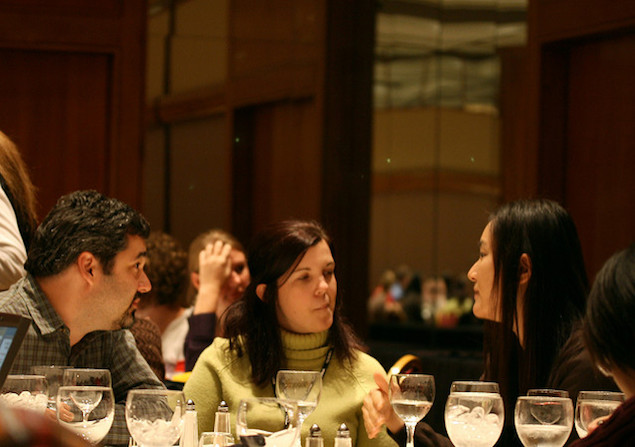Sociability • Social Virtues
The Problem of Over-Friendliness
There is a particularly poignant way to be a social disaster: through over-friendliness, a pattern of behaviour driven by the very best of motives which ends up feeling as irritating as outright rudeness.
We meet the over-friendly at the office, laughing at the jokes of the senior management; behind the desk at the hotel, wishing Sir or Madam a highly enjoyable stay and across the table on a first date, lavishly endorsing their would-be partner’s every opinion about recent books and films.
The over-friendly are guilty of three large errors:
Firstly, they believe they must agree on everything. If the other says the world is going to the dogs, they immediately nod in consent. If a second later, there is a prediction of a utopian technological future, they will agree just as much. When we say something clever, they are thrilled. When we say something equally daft, they like it no less. Their ritual approval may seem attentive. In truth, it’s a version of not listening at all.
Secondly, their praise is ill-targeted. Plenty of nice things are being said, but they are not the ones we happen to value. They claim to love our umbrella, our credit card is from their favourite bank, our chairs are deeply beautiful, we apparently have a nice way of holding our fork… but none of this counts for us if it isn’t connected up with our own sense of meaning and achievement. Everyone loves being praised, but to be praised inaccurately is its own kind of insult.
Thirdly, their friendliness is remorselessly upbeat. They point out how well we look, how impressive our job sounds, how perfect our family life seems. They want to make us feel good, but they dangerously raise the cost of revealing any of the lonelier, darker, more melancholic aspects of our characters.
By contrast, the less ardently friendly and therefore properly pleasing person will keep three things closely in mind:
Firstly, that disagreement isn’t necessarily or always terrible, that it may be exhilarating to be contradicted when we don’t feel that our dignity is at stake and that we are learning something valuable at the hands of a combative interlocutor.
Secondly, that people only want to be complimented on things they are actively proud of. The value of the currency of praise depends entirely on it not being spent too freely – and so the truly pleasing person knows they must pass over many things in discreet silence, so that when they eventually do bestow a blessing, their words can have a proper resonance.
Thirdly, that we are cheered up not so much by people who say cheery things, as by people who appear to understand us, which usually means, sympathise with our sorrows and show a willingness to travel with us to the anxious, hesitant or confused parts of our psyches.
What enables the pleasing person to please is their capacity to hold on in social encounters, even with rather intimidating and alien-seeming people, to an intimate knowledge of what satisfies them. They instinctively use their own experience as a base for thinking about the needs of others. By contrast, the over-friendly person allows themselves to forget their own likes and dislikes, under the pressure of an excessive humility which suggests to them that anyone impressive could not possibly share in the principles that drive their own psychology.
At the core of the pleasing person’s charm is a metaphysical insight: that other people cannot, deep down, ever be very ‘other’ and therefore that, in core ways, what one knows about oneself will be the master-key to understanding and getting along with strangers – not in every case, but enough of the time to make the difference.
Over-friendliness isn’t just a feature of one-to-one encounters. It’s an entrenched flaw within modern consumer society more generally. This explains why the airline exuberantly wishes us a perfect day upon landing in a new city, why the waiter hopes we’ll have a truly wonderful time around the first course and why the attendant in a clothes shop pulls such a large smile along with their suggestion that we try on a new pair of trousers.
Here too, the cause of an asphyxiating friendliness is a sudden modesty and loss of confidence around using oneself as a guide to the temperament and needs of a stranger. Companies become over-impressed by the apparent ‘otherness’ of their clients and thereby overlook how many aspects of their own selves are being trampled upon in a service context. They sidestep the knowledge that just after landing back home after a trip abroad, we may feel horrified at the thought of our responsibilities in the family; or that moods of introversion and sadness can accompany us even inside a clothes boutiques. They behave as if they were cheerful Martians encountering broken, complex humans for the very first time.
The fault of the excessively over-friendly person can, in the end, be traced back to a touching modesty. They are guilty of nothing more than a loss of confidence in the validity of their own experiences as a guide to the pleasure of others. The failure of the over-friendly types teaches us that in order to succeed at pleasing anyone, we must first accept the risk that we might well displease them through a candid expression of our being. Successful charm relies on an initial secure sense that we could survive social failure. Rehearsing how it would in the end be OK to make a hash of seducing someone is perhaps the best way to seduce them properly and confidently. We must reconcile ourselves to the risk of not making friends to stand any chance of actually making any.






























